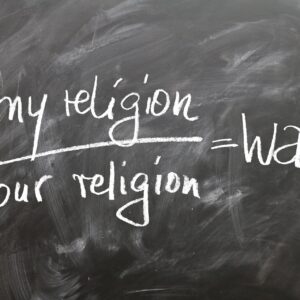It’s Christmastime 2015. I’m 61 years old, a loving husband, father of four, grandfather of nine and — eight months into the Post-Mormon portion of my life. The past two years of transition have been painful, terrifying, embarrassing, disorienting but ultimately liberating.
I am an active, faithful, lifetime member of the L.D.S. Church. I was married in the temple in the 1970s and have attended regularly for 40 years. I’ve held a variety of callings including Bishoprics, Stake callings, quorum leadership, YM leadership and many adult and youth teaching callings. I raised my four children in the Church and three of them served missions. Off the top of my head, I calculate I’ve contributed in the neighborhood of $300,000 to the church in tithing and other donations. My marriage, my family, my friends, indeed, my world have been enclosed in a bubble that is the Mormon Church.
I’ve had a charmed adult life: happy marriage, loving family, satisfying work and financial prosperity but there was always something wrong.
For over 20 years, I experienced mild, clinical depression that has been treated partially with Prozac. The symptoms seem to ebb and flow and periodically the depression becomes severe. It became fairy pronounced in 2014–15.
Gradually, I concluded that a large part of my mental distress results from a lack of self-worth I feel because God apparently chose not to testify to me regarding (among other issues) the historicity of the Book of Mormon, the Joseph Smith story and even the premise that the LDS Church is “the one true church”.
Unfortunately, for 60 years, God seemingly cursed me (for lack of a better term) not to KNOW the truth of the gospel but to simply BELIEVE on the words of others (DC 46).
So, I always had soul-crushing questions:
- Why do I NOT get the same spiritual affirmations (testimony) as others claim to receive?
- Why have I never had positive results from Moroni’s Book of Mormon challenge?
- If the gospel is supposed to be SIMPLE, why am I so CONFUSED by most aspects of Church doctrine?
- As I prayerfully study and search for truth why do the ANSWERS ALMOST ALWAYS PRODUCE MORE DOUBT?
- Why doesn’t following the Church’s counsel to “READ THE B.O.M. AND PRAY HARDER” cure any of those doubts?
Over the years, I have developed scores of specific, troubling questions about my church.
Typically, I would pray more and study harder when I came across something confusing or troubling about the church. Most of the time, that additional research did not answer the question in a faith promoting manner. Invariably, I would have to put the issue on my “to-be-answered-satisfactorily-later” shelf.
At age 60, I found myself comfortably retired with time to research the depression-inducing book shelves of troubling questions. I had scores of them:
- Church leaders openly inferred that I was wasting my time thinking about those issues because the thinking had already been done for me.
- Over the years, I studied primarily faithful LDS sources and not only did I not find satisfactory answers, I developed MORE questions.
- For decades, I read the canonized, written works of the church over and over and they were a mass of confusion to me… So I put them on the shelf.
- I followed the Mark Hoffman forgeries episode closely and I came away perplexed that the one-and-only-living-prophet of the one-true-church could be so deceived by a con man… I put that on the shelf.
- Ten years ago, I read Bushman’s biography of Joseph Smith, Rough Stone Rolling, and I was stunned… I was in a Bishopric at that time and I put that on the shelf.
- Over the years, I have read significant portions of the Journal of Discourses and I have been demoralized… and put it on the shelf.
- I read BH Roberts’s Studies of the Book of Mormon and I felt betrayed by never hearing that stuff in church… and put it on the shelf.
- I read sections of the Joseph Smith Papers project and I have come to understand that what I have been taught by the church (in many areas) is at best: evolving, at worst: untrue or distorted… I put it on the shelf.
- I agonized over the racism of withholding the priesthood and temple ordinances from blacks.
- I became perplexed over the deceit and the whitewashing of polygamy at the highest levels of the Church.
- I rolled my eyes and felt pain in my stomach in the temple where I have been taught that women are simply a help-meat to men who receive salvation only through their husbands… but I put it on the shelf.
- I consulted article after article and book after book by LDS apologists and found their answers to biased, unconvincing and sometimes pathetic.
- In 2014, I discovered via the internet that there are hundreds of thousands of Mormons, maybe millions just like me who have the same questions regarding the same issues.
- Consequently, I found that there are far more LDS Church “problems” than I had ever imagined.
In early 2015, I stumbled upon “the Essays” published by the Church on its website LDS.org which address some of these troubling questions. I walked away from that experience with a confirmation that almost all of the problems I had with the Church are admittedly REAL problems and “the-one-true-church” with a direct pipeline to God (incredibly) has no satisfactory answers to ANY of them.
In short, my shelves came crashing down.
For me, the essays put the Good Housekeeping seal of approval on my studied and prayerful conclusion that my perception of God’s one-true-church as simply a mass of confusion was justified.
The best analogy I have is this: At an early age, I was given a box containing a jig-saw puzzle. The picture on the box was a beautiful and complete picture of a perfect Mormon world. During my lifetime, I have been trying to complete the puzzle to match the picture on the box but I have been stymied to complete it because I have scores of pieces that simply do not fit, anywhere. I’ve been told that I’m not trying hard enough, I’m not worthy enough and the pieces will fit if I just obey, focus and work harder. Then, in an epiphany at age 61, I discovered the truth: the errant pieces actually do not fit, never did, never will… and more importantly, it’s not my fault.
For years, I felt like a part of me was dead inside, now a crushing weight has been lifted from my shoulders and I finally have some peace.
With that peace has come a good deal of collateral issues that bring future challenges.
I finally discussed my de-conversion with my true-believing-Mormon wife (whom I love more than life-itself) and I effectively broke her heart. The last eight months have been painful. I have loving children, grandchildren and friends who have been (or are about to be) hit with this ton of bricks. I cringe at what could happen to our relationships and our happiness.
In April 2015, I asked to be released from my calling as Ward Clerk. A few weeks later I emailed my Bishop (respectfully) with a non-detailed summary of the same information I’ve noted above with a thank you and statement that I would no longer be attending church. He replied that he respected my decision and would like to discuss my specific issues. I replied that I would love to meet with him. That was May 2015. As of this writing, eight months later, I have not heard back from him. I can empathize with that.
Today, I’m in a state of uneasy liberation. That, with a hint of imbalance like the proverbial “Fiddler on the Roof”. Also, occasional pangs of guilt; Guilt from being so gullible; Guilt from misleading my children; Guilt from judging others; Guilt from providing tacit support for racism and homophobia; Guilt from allowing others to do my thinking.
Heading into 2016, I find myself mostly relieved but a little lonely at times with few objective ears to talk to except my therapist, a few acquaintances from my new Sunday morning ex-mo meet-up group and of course, my struggling but loving wife.
It’s a bit of a sad conclusion to 60 years of faithful devotion to a church, but I now have an open doorway to an honest and authentic future. I’m OK with that.




This is so similar to my feelings it’s weird. Does the church contribute to depression for those of us who don’t get a witness? I’m becoming more and more convinced that it does.
This is awesome! Guilt is not a natural emotion to feel and the church capitalizes on that to the fullest. I hope your experience leaving has gotten better as time has gone on. It’s definitely strange to know that people who once viewed you as a friend now can pity you and think there must be something wrong with you because you don’t believe their lies anymore. You’re not the only one in that ward who has left and I daresay you won’t be the last.
Welcome to the Exmo life. I’m 52, left Mormonism and proclaimed my gay status 2 years ago. Now, I’m happily married to a man, and, except for a few bouts of anger and guilt, enjoying life without religion, but still trying for some spirituality. It certainly wasn’t the “good ship lollipop” that we were on, was it?
I especially appreciate your “soul-crushing questions”, as I feel all members battle with those at times. Some are better than others at rationalizing away such questions.
Also, your conclusion that, “I’m OK with that” is one of those special moments for me as well — realizing that life without the Church institution is not as terrible as I was led to believe it would be.
Thanks, Larry.
Thank you for sharing your journey. You are not alone. Don’t feel guilty, but understand that that is part of the “debriefing” that we go through after so many years of faithful service to an organisation that doesn’t know or want to know how it has been a part of the problem.
Its interesting that you have used the analogy of the “shelf”. It seems to be the only answer in dealing with the problems in the church. Ive put my own thoughts together with that shelf in mind and will post it soon. Hopefully you will see that your not the only person that has gone on this journey.
Ive found that a loving family continues to love each other unconditionally as the Saviour would. Your family knows the intent of your heart and so will love you regardless of your feelings towards the church. Obviously they will try and “bring you back” and that is where you need to be strong and loving back.
Please know that your words have brought me comfort in my struggles.